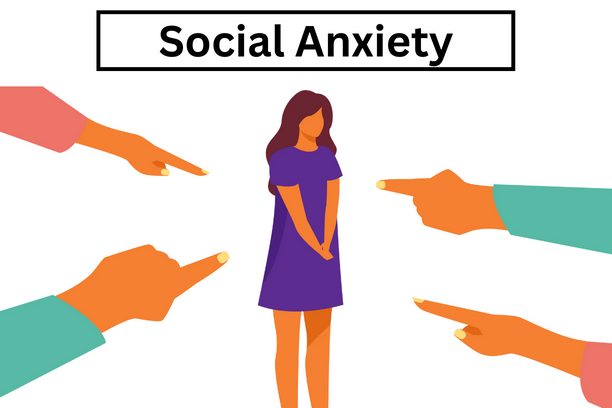Social anxiety, often known as social phobia, affects millions of individuals worldwide, yet it remains a widely misunderstood mental health condition. In today’s brief description, we will delve into the depths of social anxiety, exploring its definition, symptoms, causes, and treatment options.
Defining Social Phobia
Defining Social Anxiety: General anxiety refers to an intense and persistent fear of community-based situations where individuals believe that others may scrutinize, judge, or negatively evaluate them. It goes beyond ordinary shyness and can significantly hinder a person’s daily life and well-being.
The Silent Struggle
Symptoms of Social Anxiety
Individuals grappling with social phobia may experience a spectrum of emotional, cognitive, and physical symptoms when confronted with social situations, including:
- Intense Fear: Overwhelming fear or anxiety about general interactions or performances.
- Physical Symptoms: Experiencing sweating, trembling, blushing, a racing heart, nausea, and muscle tension.
- Negative Self-Perception: Exhibiting excessive worry about being embarrassed, humiliated, or rejected by others.
- Avoidance Behavior: Avoiding social situations or enduring them with intense discomfort.
- Impaired Functioning: Finding that social anxiety interferes with an individual’s ability to work, attend school, or maintain relationships.
The Root Causes
What Leads to Social Anxiety?
Although the precise cause of social anxiety remains elusive, several factors may contribute to its development, including:
- Genetics: There is evidence suggesting a genetic component to social anxiety, indicating that it can run in families.
- Brain Chemistry: Imbalances in brain chemicals, such as serotonin, may play a role in the development of social anxiety, impacting mood and anxiety levels.
- Environmental Factors: Traumatic or embarrassing experiences in social situations can contribute to the onset of social anxiety.
- Learned Behavior: Observing others’ social anxiety or receiving critical feedback during social interactions can reinforce this condition.
Seeking Help and Treatment
Overcoming Social Anxiety
Thankfully, social phobia is a treatable condition, and various approaches can help individuals manage and overcome it:
- Therapy: Cognitive Behavioral Therapy (CBT) is often considered the gold standard for treating social phobia. CBT assists individuals in identifying and challenging negative thought patterns while developing effective coping strategies.
- Medication: In some cases, healthcare professionals may prescribe medications like selective serotonin reuptake inhibitors (SSRIs) or anti-anxiety medications to alleviate symptoms.
- Self-Help Strategies: Acquiring skills in relaxation techniques, mindfulness, and self-compassion can serve as valuable tools in managing general phobia.
- Support Groups: Joining support groups or seeking social support from friends and family can establish a sense of community and understanding.
The Importance of Awareness
Breaking the Stigma
One of the most significant challenges individuals with social phobia face is the stigma attached to mental health conditions. Many people suffer in silence due to fear of judgment or lack of awareness about their condition.
Raising awareness about social phobia and mental health, in general, is crucial in breaking down these barriers. It encourages individuals to seek help without shame and fosters a more compassionate and understanding society.
A Journey to Recovery
Embracing Progress, Not Perfection
Recovery from social phobia constitutes a journey, not a specific destination. It’s crucial to understand that setbacks may occur, but they should not define a person’s progress. Embracing imperfection and celebrating small victories along the way can provide a powerful motivator.
Learn more:
FAQS
What are 3 symptoms of social anxiety?
Three common symptoms of general worry include excessive fear or apprehension in community-based situations, physical symptoms like sweating and trembling, and negative self-perception, such as worrying about being judged by others.
How do I fix social anxiety?
Fixing general worry typically involves seeking professional help, such as therapy (Cognitive Behavioral Therapy is effective), considering medication, practicing relaxation techniques, and gradually facing feared social situations.
How do you know if you have social anxiety?
You may have social phobia if you consistently experience intense fear or apprehension in social settings, leading to avoidance behavior, physical symptoms, and a persistent belief that others are negatively evaluating you.
What triggers social anxiety?
Communal anxiety can be triggered by various factors, including past negative general experiences, fear of humiliation or embarrassment, high-pressure situations like public speaking or interviews, and a predisposition to anxiety based on genetics or brain chemistry.
In conclusion
General anxiety is a challenging condition that can significantly impact a person’s life. However, with the right treatment, support, and self-compassion, individuals can learn to manage their symptoms and lead fulfilling lives.
If you or someone you know is struggling with Communal anxiety, remember that help is available. Reach out to a mental health professional or support group to embark on the path to recovery. Communal anxiety may be a formidable opponent, but it can be conquered with determination, understanding, and the right resources.
